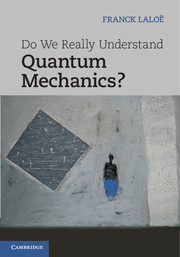Book contents
- Frontmatter
- Contents
- Foreword
- Preface
- 1 Historical perspective
- 2 Present situation, remaining conceptual difficulties
- 3 The theorem of Einstein, Podolsky, and Rosen
- 4 Bell theorem
- 5 More theorems
- 6 Quantum entanglement
- 7 Applications of quantum entanglement
- 8 Quantum measurement
- 9 Experiments: quantum reduction seen in real time
- 10 Various interpretations
- 11 Annex: Basic mathematical tools of quantum mechanics
- Appendix A Mental content of the state vector
- Appendix B Bell inequalities in non-deterministic local theories
- Appendix C An attempt for constructing a “separable” quantum theory (non-deterministic but local)
- Appendix D Maximal probability for a state
- Appendix E The influence of pair selection
- Appendix F Impossibility of superluminal communication
- Appendix G Quantum measurements at different times
- Appendix H Manipulating and preparing additional variables
- Appendix I Correlations in Bohmian theory
- Appendix J Models for spontaneous reduction of the state vector
- Appendix K Consistent families of histories
- References
- Index
3 - The theorem of Einstein, Podolsky, and Rosen
Published online by Cambridge University Press: 05 September 2012
- Frontmatter
- Contents
- Foreword
- Preface
- 1 Historical perspective
- 2 Present situation, remaining conceptual difficulties
- 3 The theorem of Einstein, Podolsky, and Rosen
- 4 Bell theorem
- 5 More theorems
- 6 Quantum entanglement
- 7 Applications of quantum entanglement
- 8 Quantum measurement
- 9 Experiments: quantum reduction seen in real time
- 10 Various interpretations
- 11 Annex: Basic mathematical tools of quantum mechanics
- Appendix A Mental content of the state vector
- Appendix B Bell inequalities in non-deterministic local theories
- Appendix C An attempt for constructing a “separable” quantum theory (non-deterministic but local)
- Appendix D Maximal probability for a state
- Appendix E The influence of pair selection
- Appendix F Impossibility of superluminal communication
- Appendix G Quantum measurements at different times
- Appendix H Manipulating and preparing additional variables
- Appendix I Correlations in Bohmian theory
- Appendix J Models for spontaneous reduction of the state vector
- Appendix K Consistent families of histories
- References
- Index
Summary
More than 70 years after its publication, the article by Einstein, Podolsky, and Rosen (EPR) [88] is still cited hundreds of times every year in the literature; this is a very exceptional case of longevity for a scientific article! There is some irony in this situation since, for a long time, the majority of physicists did not pay much attention to the EPR reasoning. They considered it as historically interesting, but with no precise relevance to modern quantum mechanics; the argument was even sometimes completely misinterpreted. Astriking example is given in the Einstein-Born correspondence [89] where Born, even in comments that he wrote after Einstein's death, clearly shows that he never completely understood the nature of the objections raised by EPR. Born went on thinking that the point of Einstein was a stubborn rejection of indeterminism (“look, Albert, indeterminism is not so bad!”), while actually the major concern of EPR was locality and/or separability (we come back later to these terms, which are related to the notion of space-time). If giants like Born could be misled in this way, no surprise that, later on, many others made similar mistakes!
This is why, in what follows, we will take an approach that may look elementary, but at least has the advantage of putting the emphasis on the logical structure of the arguments and their generality. Doing so, we will closely follow neither the historical development of the ideas nor the formulation of the original article, but rather will emphasize the generality of the EPR reasoning.
- Type
- Chapter
- Information
- Do We Really Understand Quantum Mechanics? , pp. 38 - 55Publisher: Cambridge University PressPrint publication year: 2012



